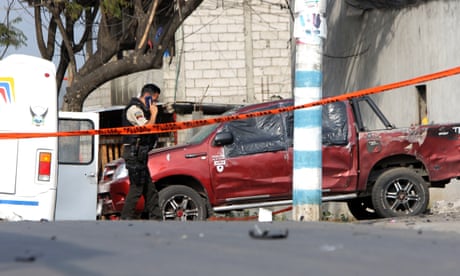THAT IS A TINY BOMB
Ecuadorian TV presenter wounded by bomb disguised as USB stickLenin Artieda was one of several journalists targeted by explosive devices mailed out across the country
Staff and agencies in Quito
Tue 21 Mar 2023

An Ecuadorian television presenter was wounded after a bomb disguised as a USB stick exploded when he inserted it in his computer, after explosive devices were sent to journalists across the country.
Lenin Artieda suffered minor injuries in the blast, which happened in the newsroom of Ecuavisa TV in Guayaquil.
The country’s attorney general’s office announced on Monday that it had launched a terrorism investigation after journalists at several news outlets were sent envelopes containing similar explosive devices.
“It’s a military-type explosive, but very small capsules,” said Xavier Chango, the national head of forensic science, referring to the explosive sent to Ecuavisa.
The envelopes sent to journalists had similar characteristics and the same contents and so would be investigated jointly, the attorney general’s office said in a statement, without naming the media organizations affected.
The police carried out a controlled detonation of a device sent to the news department of TC Television, also in Guayaquil, prosecutors said earlier on Monday.
Regional freedom of expression advocacy group Fundamedios said a third television station and radio outlet in Quito had also received envelopes with explosives.
The Television channel Teleamazonas said one of its journalists had received an anonymous envelope on Thursday and upon opening it had discovered a device, which the police confirmed contained explosives.
The government said it would defend freedom of expression in the country.

Headless bodies and deadly bombs: cartel violence escalates in Ecuador
“Any attempt to intimidate journalism and freedom of expression is a loathsome action that should be punished with all the rigor of justice,” it said in a statement.
Ecuador’s president, Guillermo Lasso, has blamed rising violence on competition between drug trafficking gangs for territory and control.
Ecuador, which sits between Colombia and Peru, the world’s two largest cocaine-producing countries, is a strategic drug-smuggling route due to its long Pacific coastline and large shipping and fishing fleets.
Analysts say criminal gangs emboldened by lucrative links to Mexican drug cartels are using terror tactics to intimidate the authorities and civilians as the country of nearly 18 million teeters on the edge of becoming a narco-state.
No comments:
Post a Comment